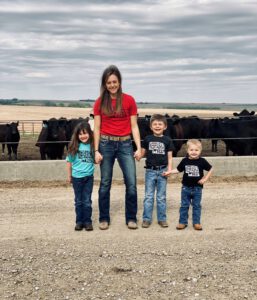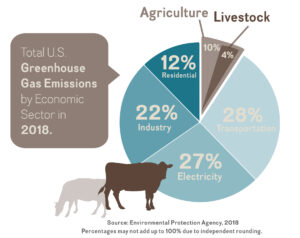As a mother of three, and a cattle feeder near Howells, Nebraska, the beef industry is very important to me. I have been working in the beef industry actively for over 15 years. Beef plays a huge role in my life, both as a career and as a healthy way to feed my family.
Grilling season is in full swing, and there is a lot of hype about “meatless meat” circling the protein industry. As a CommonGround volunteer and a cattle feeder, I would like to address a few common misconceptions regarding the nutritional value and environmental impacts of meatless meats to help you during your next trip to the grocery store.
Whether you choose to eat alternative proteins or real meat, the choice is yours, and both are safe and have nutritional value. Our goal is to help you base your food decisions on facts, not on fear or misinformation.
Is alternative protein healthier than real meat?
A: No. Just because the label may read “plant-based” does not mean it is a healthier or more sustainable option. The USDA says that Americans are now eating 24% less red meat than in 1976. Since that time, we have attempted to blame red meat for health issues like cardiovascular disease and cancer. Recent analysis of these studies shows that decreasing red meat consumption has little to no effect on reducing such diseases. Secondly, check the ingredients! Alternative meat options tend to have very high sodium levels (1,100mg per serving), and can include dozens of added ingredients. Beef has always had – and will always have – one ingredient: beef. Beef is a nutritional powerhouse that naturally contains protein, B12, zinc, selenium, niacin, B6, phosphorus, riboflavin, iron and choline. Did you know that a healthy diet and lifestyle that includes beef can actually decrease cholesterol levels, according to the American Journal of Clinical Nutrition?
Would giving up meat reduce greenhouse gas emissions?
A: Not necessarily. Reducing or eliminating the consumption of meat would have such a small effect on overall greenhouse gas emissions that there is no reason to include it in your strategy to live more sustainably. According to the Environmental Protection Agency, agriculture accounts for 10% of all greenhouse gas emissions. That includes everything from farm to plate. Of that 10%, livestock represents only 4% of the greenhouse gas emissions. Beef is one of the best sustainable resources we can provide to consumers for a protein source.
At the end of the day, the choice is yours. In the United States, we are fortunate to have many food options. There is room for alternative proteins in our diets (and those alternative proteins also benefit farmers!). However, misleading labels and marketing claims can often cloud our judgement. I encourage you to consider the facts to help guide your food purchasing decisions. Next time you are in the grocery store, don’t let false label claims confuse and scare you.
If you’re ever confused or need additional information, reach out to a CommonGround volunteer or another farmer.
As a mother of three and a cattle feeder, I have and always will be comfortable knowing when I feed my family beef, I am doing the right thing for my family. I know what goes into that piece of real meat, and I know how nutritious, healthy and sustainable it really is!



